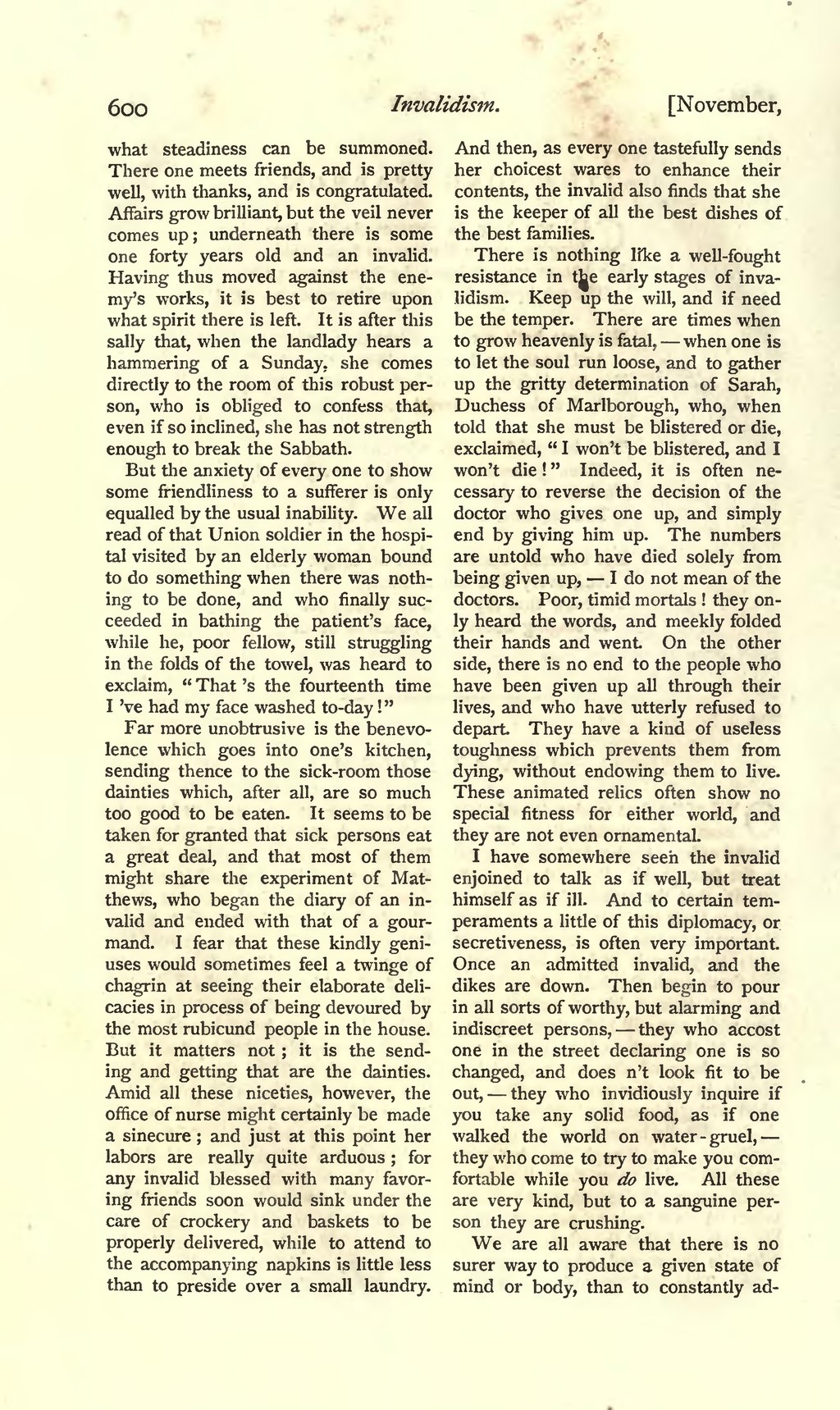what steadiness can be summoned. There one meets friends, and is pretty well, with thanks, and is congratulated. Affairs grow brilliant, but the veil never comes up; underneath there is some one forty years old and an invalid. Having thus moved against the enemy's works, it is best to retire upon what spirit there is left. It is after this sally that, when the landlady hears a hammering of a Sunday, she comes directly to the room of this robust person, who is obliged to confess that, even if so inclined, she has not strength enough to break the Sabbath.
But the anxiety of every one to show some friendliness to a sufferer is only equalled by the usual inability. We all read of that Union soldier in the hospital visited by an elderly woman bound to do something when there was nothing to be done, and who finally succeeded in bathing the patient's face, while he, poor fellow, still struggling in the folds of the towel, was heard to exclaim, "That's the fourteenth time I've had my face washed to-day!"
Far more unobtrusive is the benevolence which goes into one's kitchen, sending thence to the sick-room those dainties which, after all, are so much too good to be eaten. It seems to be taken for granted that sick persons eat a great deal, and that most of them might share the experiment of Matthews, who began the diary of an invalid and ended with that of a gourmand. I fear that these kindly geniuses would sometimes feel a twinge of chagrin at seeing their elaborate delicacies in process of being devoured by the most rubicund people in the house. But it matters not; it is the sending and getting that are the dainties. Amid all these niceties, however, the office of nurse might certainly be made a sinecure; and just at this point her labors are really quite arduous; for any invalid blessed with many favoring friends soon would sink under the care of crockery and baskets to be properly delivered, while to attend to the accompanying napkins is little less than to preside over a small laundry. And then, as every one tastefully sends her choicest wares to enhance their contents, the invalid also finds that she is the keeper of all the best dishes of the best families.
There is nothing like a well-fought resistance in the early stages of invalidism. Keep up the will, and if need be the temper. There are times when to grow heavenly is fatal,—when one is to let the soul run loose, and to gather up the gritty determination of Sarah, Duchess of Marlborough, who, when told that she must be blistered or die, exclaimed, "I won't be blistered, and I won't die!" Indeed, it is often necessary to reverse the decision of the doctor who gives one up, and simply end by giving him up. The numbers are untold who have died solely from being given up,—I do not mean of the doctors. Poor, timid mortals! they only heard the words, and meekly folded their hands and went. On the other side, there is no end to the people who have been given up all through their lives, and who have utterly refused to depart. They have a kind of useless toughness which prevents them from dying, without endowing them to live. These animated relics often show no special fitness for either world, and they are not even ornamental.
I have somewhere seen the invalid enjoined to talk as if well, but treat himself as if ill. And to certain temperaments a little of this diplomacy, or secretiveness, is often very important. Once an admitted invalid, and the dikes are down. Then begin to pour in all sorts of worthy, but alarming and indiscreet persons,—they who accost one in the street declaring one is so changed, and doesn't look fit to be out,—they who invidiously inquire if you take any solid food, as if one walked the world on water-gruel,—they who come to try to make you comfortable while you do live. All these are very kind, but to a sanguine person they are crushing.
We are all aware that there is no surer way to produce a given state of mind or body, than to constantly ad-
